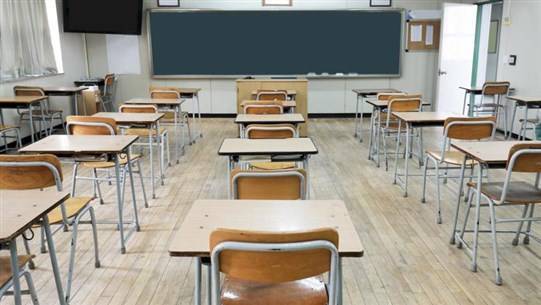The anger of teachers is almost translating into a complete closure of public schools, with their frustration and resentment evident in the hallways and between classrooms. The many promises they receive are not translating into funds, and the school year is dragging slowly for them, while their hope for a change that could restore some dignity to their lives prevents them from submitting their resignation. The reality they live forces them into choices they are not accustomed to making; for instance, one teacher preferred to buy medicine rather than fill her car with fuel to reach school. She admits that she stood for moments in front of the pharmacy and the gas station, weighing her options, before making a decision, stating plainly that after this experience, she would not go back to school as she cannot reach it.
**Statements and Visits**
...In similar circumstances that the teaching sector is entirely suffering from, a statement is released by the education unions (Basic, Secondary, and Vocational) following their meeting with the Minister of Education last Tuesday, which offers little substance. The teacher finds themselves faced with promises from the minister, wishes from the unions, and congratulations to the teachers for the budget approval after a month of waiting due to the President's signature delays. There is nothing new under the sun, and no funds in teachers' accounts other than the three million that were spent before the end of the first week of the month. What best expresses the condition of teachers toward their unions is the voice messages sent to union leaders asking if they are still alive, or in their union positions, or if they really know what is happening on the ground!
**Divisions Within the Unions**
Disagreements plague the education unions, as there have been no meetings of the Secondary Education Union since the school year began, nearly since the beginning of October. The union president attends ministry meetings without informing the rest of the administrative body, who have learned about events through the media. The Secondary Education Union has become diversified, with each faction seeing solutions differently; some propose seriously reducing school hours in line with teachers' salaries, while others want to go on strike, and the dominant part believes in procrastinating.
In contrast, Haidar Khalifa, Secretary of the union and participant in the minister’s meeting last Tuesday, confirms that the Secondary Education Union warned the minister about the fate of the school year if promises are not kept, particularly the social incentives estimated at $130, placing the responsibility for continued teaching on the ministry, not the union. Khalifa relates the ambiguity in determining the dates and methods of disbursing incentives to the "lack of trust from donor entities in the Lebanese state, and the manner of distributing funds," on one hand, and "the unreliability of UNICEF, which request many unsubstantiated transactions." Consequently, "It is expected that the Minister of Education will issue a written statement this week regarding the incentives, following his meeting with the Prime Minister and a UNICEF representative," according to Khalifa. The only silver lining that could assist teachers is the "confirmation from the financial departments in the Ministry of Education to pay all dues from additional salaries, according to the new budget, and transport allowances before the end of December."




